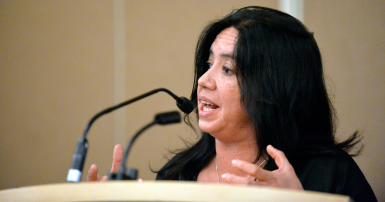
But any peace agreement will be incomplete unless social movements and victims of the armed conflict are also at the table, says Berenice Celeita from the Colombian human rights organization NOMADESC.
NOMADESC - CUPE’s Global Justice project partner in Colombia, works to defend the rights of Colombian communities and trade unionists. They are an integral part of human rights defence work in the southwest of the country.
Celeita explained that the 50-year war in Colombia has left more than 350,000 dead – over 3,000 of them trade unionists – and displaced over six million from their communities. Colombia has the highest number of trade unionists killed in the world and the second highest number of displaced people in the world after Syria.
“Millions of poor farmers have been displaced from their land by large agricultural producers,” said Celeita. “Artisanal miners (also known as subsistence miners – they do not work for a mining company) as well as indigenous communities are forced from their land so that multinational companies can exploit natural resources,” she said. Over 70 per cent of land has been given in concessions to multinational companies that exploit resources and the environment.
A lasting peace accord needs to address the social and economic inequality that is being entrenched by free trade agreements – such as the Canada-Colombia free trade agreement.
Celeita calls for the peace process to provide justice to the families of the victims of violence by prosecuting those responsible. The Colombian people want peace, but they want justice too.


